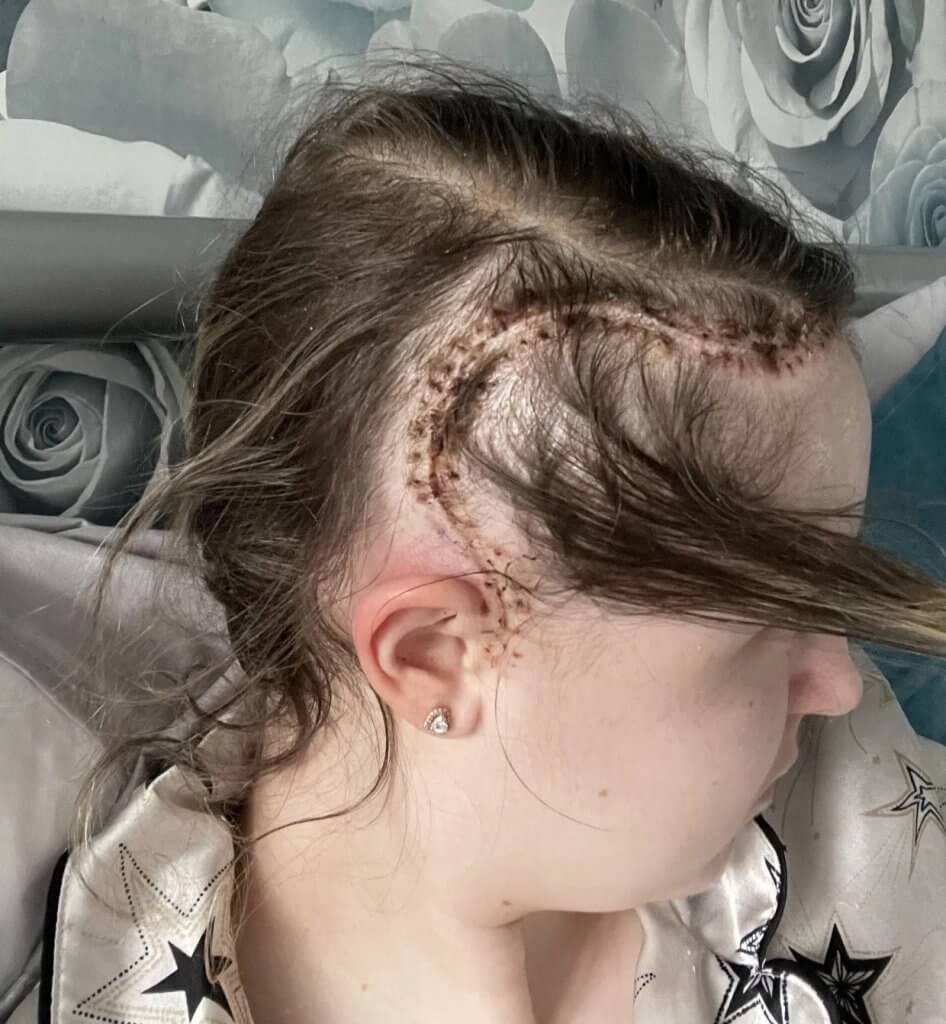Advocating For Yourself
- Holly Worswick, 22, had a benign (non-cancerous) tumor in her brain, and the surgery left a dent in her skull.
- Doctors discovered that Worswick had a meningioma the most common type of tumor that forms in the head. Meningioma tumors arise from the meninges the membranes that surround the brain and spinal cord.
- Doctors recommend that you see a doctor if you have the sudden onset of seizures or changes in vision like Worswick or memory as it could be a meningioma; most of the time, meningioma symptoms develop slowly over time, but sometimes can require emergency care.
Worswick, 22, ended up having a benign (non-cancerous) tumor in her brain, and the surgery left a massive dent in her skull, highlighting the importance of seeking medical attention if you feel symptoms arise.
Read MoreMeningiomas aren't technically brain tumors, Dr. Suriya Jeyapalan, director of medical neuro-oncology at Tufts Medical Center in Boston, Mass., tells SurvivorNet; they are tumors that arise from the meninges the membranes that surround the brain and spinal cord. But the tumors can compress or squeeze the adjacent brain, nerves and vessels.
Thankfully Worswick's meningioma was benign; most brain tumors aren't actually cancerous, according to the American Brain Tumor Association. Less than one third about 32% of brain tumors are considered cancerous, or malignant.
If the tumor is made up of "normal-looking cells," that means the tumor is benign like in Worswick's case. But, also like Worswick, those kinds of tumors may still require surgery. Regardless, her doctors said it could've been fatal.
"The surgeon said it's been growing for 10 years," Worswick said. "(Growing) 1 (to) 2 mm per year, like a ticking time bomb. So it would have just kept on growing if the opticians didn't recognize it."

Symptoms, Diagnosis and Subsequent Surgery
Worswick told The Sun she was getting frequent headaches, and when she would drive her car, her sight would "just go." She first thought it was maybe because she wasn't drinking enough water.
"I thought, 'This isn't normal,' so I went to the doctor and they just thought it was to do with the pill I was on. I'm not a doctor, so I don't know what they could have done, but they didn't even look into it, which is a bit ridiculous to be honest."
Once the tumor was discovered, Worswick underwent an eight-hour surgery at Salford Royal Hospital in Salford, U.K., on Feb. 16 the morning after her diagnosis and the meningioma was successfully removed. During the surgery, surgeons cut away the front right quarter of her skull, scooped out the mass and reattached the bone, The Sun reports.
One month after the operation, in March, Worswick felt fluid spilling from her nose; she was readmitted to the hospital because her skull bone was infected and needed to be removed to drain the fluid. She was left with a large dent in her head after doctors removed the piece of infected skull.

She underwent surgery again on July 20, when surgeons inserted a metal plate to cover the gap in her skull. Her stitches were removed on Aug. 5 signaling the end of Worswick's five-month "rollercoaster" that left her fearing death.
"The minute I got on the bed to go down for the first operation that's the most scared I've been in my life," Worswick said. "It dawned on me that I might not be alive or something might go wrong. I might have some permanent damage and I might not get the life back that I had. I could have gone blind."
Related: Kicking Cancer's Ass One Survivor's Advice for Taking On Brain Cancer
Meningiomas Symptoms; When To See Your Doctor
The signs and symptoms of a meningioma depend on its location, according to the National Cancer Institute, and may even be subtle at first.
Even though a meningioma isn't technically a brain tumor, the symptoms are relatively the same as other brain tumors, such as a glioblastoma. The symptoms of a brain tumor, or even brain cancer if the tumor is malignant, can frequently and easily change, Jeyapalan tells SurvivorNet.
"But for I think this is the take home message for I think a lot of patients: Brain cancer is actually really rare," Jeyapalan said. "Lung cancer, breast cancer, colon cancer, are much more common."
"Everybody's always scared about getting their brain tumor and, you know, 'Oh, should I be using my cell phone or what not,' and I tell them, 'No, you should be much more scared about the fact that you're, you know, you're hypertensive, you're diabetic, you have high cholesterol, you're overweight, you're not exercising enough," she added.
Symptoms can include:
- Changes in vision seeing double or blurriness
- Headaches like in Worswick’s case especially ones that are worse in the morning
- Hearing loss
- Memory loss or confusion
- Loss of smell
- Seizures
It's recommended that you see a doctor if you have the sudden onset of seizures, or changes in vision like Worswick or memory as it could be a meningioma; most of the time, meningioma symptoms develop slowly over time, but sometimes can require emergency care.
Be your own advocate when it comes to your health care.
Make an appointment with your doctor if you feel you have symptoms, such as headaches that worsen over time, that concern you. But most times, meningiomas are only discovered on scans for reasons that turn out to be unrelated to the tumor.
But it's important to remember to advocate for yourself.
Learn more about SurvivorNet's rigorous medical review process.


